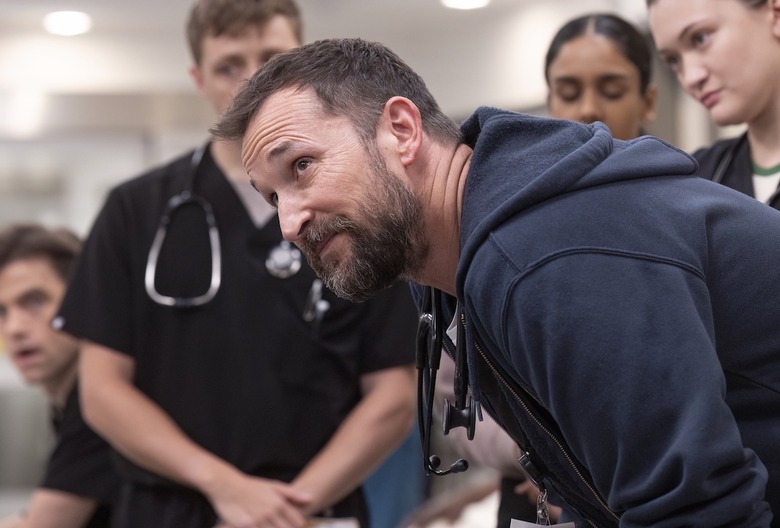Noah Wyle Takes Us Inside The Pitt — And Reveals Why He Was 'Not Sorry' To See Planned ER Revival Get Scrapped
Thirty years after ER "set the tone" for all medical dramas that followed, series star Noah Wyle has re-teamed with executive producers John Wells and R. Scott Gemmill on The Pitt, which ups the adrenaline with its real-time format.
The first two episodes, which are now streaming on Max, represent the first two hours of emergency department chief Michael "Robby" Robinavitch's shift at Pittsburgh Trauma Medical Center — a shift that begins with talking a fellow doc (played by recurring guest star Shawn Hatosy) down off a ledge after a particularly soul-crushing night in the E.D. It also happens to be the fifth anniversary of the day Robby's predecessor, Montgomery Adamson, succumb to COVID, and he still blames himself for his mentor's demise.
Nevertheless, Robby must put his game face on and welcome a new crop of emergency medicine hopefuls. Those include genial second-year resident Dr. King (Taylor Dearden), arrogant intern Santos (Isa Briones), and doe-eyed med students Javadi (Shabana Azeez) and Whittaker (Gerran Howell). With the help of senior residents Collins (Tracy Ifeachor) and Langdon (Patrick Ball), third- and second-year residents Mohan (Supriya Ganesh) and McKay (Fiona Dourif), and charge nurse Evans (Katherine LaNasa), he'll guide them through their first 15 hours down in "The Pitt."
Below, Wyle explains how a nixed ER revival — you might've read about it — led to the creation of The Pitt, what it was like to see a cast of up-and-comers in the same position he was in when he first scrubbed in as John Carter more than 30 years ago, and the significance of the grief that burdens Robby in Season 1.
TVLINE | I know that the impetus to rejoin forces with Wells and Gemmill was to make something that honored the first responders who reached out to you at the height of COVID, as ER saw a resurgence on streaming. But I've seen 10 (out of 15) episodes, and I was struck by how different this show feels from ER. Was the real-time format baked in from the get-go, and was that part of what excited you about a return to the genre?
That calls into question all the various chronologies of this and all the different sort of iterations. You're absolutely right, the intentionality was born in 2020 during the pandemic, with an inbox that was full of really gratifying messages from people that were on the front lines — and they weren't just compliments, they were also kind of cries for help. They were "hear what I'm going through" kind of messages, "get the word out" kind of messages, you know? "We're tired... our morale is flagging... we're getting sick... we're dying... we're getting abused. We're getting taken for granted, and people banging on pots at the end of our shift is not helping."
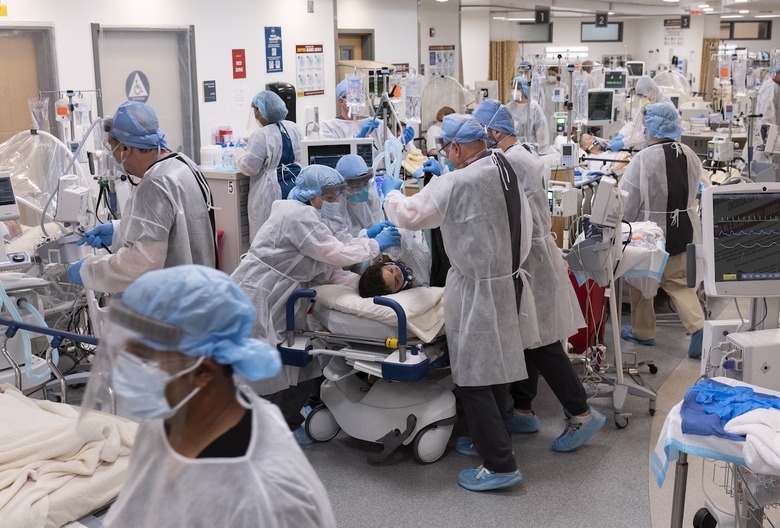
The idea was to take a look at what was happening to the people that were on the front lines, and also take a look at the population that was getting sick and dying, and seeing how there appeared to be two different health care systems in our country — those for people who have money and insurance, and those who don't. And those were all issues we tried to talk about back in the '90s, when 22 million Americans were going without health insurance and using emergency rooms as their primary source of health care. All of these themes were really significant to us then, and they have remained significant to us, so I reached out to John, saying, "I know you don't want to do that again, but if you ever want to do this, let me know, because I'd love to volunteer and be your spokesperson for whatever you want to say on the subject." And then it just became, well, "Is the old IP the easiest and most advantageous delivery system?" It seemed to be the one that people were most excited about trying, but it wasn't really the point of the exercise. The more we went down that road, the more the point got obscured in the reunion aspect, the retread aspect, the reboot aspect... so I was not sorry when, you know, we were sort of forced to pivot and figure out how to tell the story in a new way. In a lot of ways, [not reviving ER] unburdened us from narrative limitations that we would have had to adhere to, and pay homage to.
Scott brought the real time storytelling framework to the table, and John, Max and Warner Brothers were on board to try to make use of this new platform of streaming, to see whether or not we could tell the story in a visually more arresting way than we did back in the '90s — a more photorealistic way than we were ever able to do, and in a more organic, performance-based way. Because you're no longer to standards and practices and language [barriers], you really can paint with all the colors on the palette. The question isn't "What can you show?" it's "What should you show, in discretion and taste?" It was really gratifying.
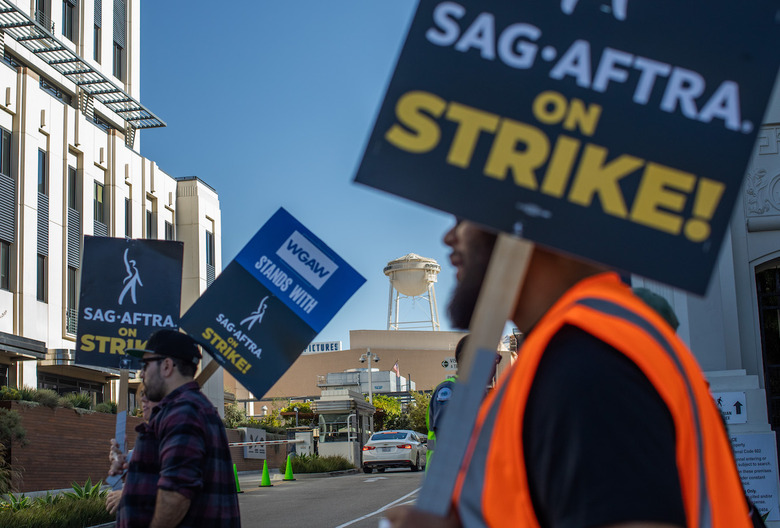
Then in 2023, [we had a] 192-day labor strike [in Hollywood]. Two strikes put a big pause in everybody's ability to tell any kind of story, and put into question, "What kind of stories will we be telling on the other side of this strike?" I spent all that time just thinking about who I wanted to work with, what kind of work I wanted to do, what kind of experience I wanted. I wanted it to feel like what it used to feel like, and what it hadn't felt like for a long time. Could we make it feel that way again? John and Scott were on board for that because they, too, have been looking for that feeling that we all [last] had 15 years ago, when we did this the first time. The work felt good, and we had a good time, and we liked each other while we did it, and everybody was respectful. It was inclusive, and it was groundbreaking. And we wanted to see if lightning could strike twice — and, in some ways, it already has.
TVLINE | You have an incredibly talented cast of up-and-comers, all of whom play these very green physicians. This past year, of course, marked 30 years since you were in their shoes, as third-year med student John Carter. What was it like that first day you were on set and filming with all of them? Did you see a bit of yourself in each of them? Was there an element of déjà vu?
There was a lot of déjà vu. There was a lot of reckoning, and dancing with ghosts through the rehearsal process and through medical boot camp. Mostly, I felt a sense of envy, because it's so much easier, in some ways, to start with your eyes wide in a place of inefficiency and non-proficiency. The student just gets to, sort of... look lost. I was more concerned about looking like a pro in front of them and not embarrassing myself.
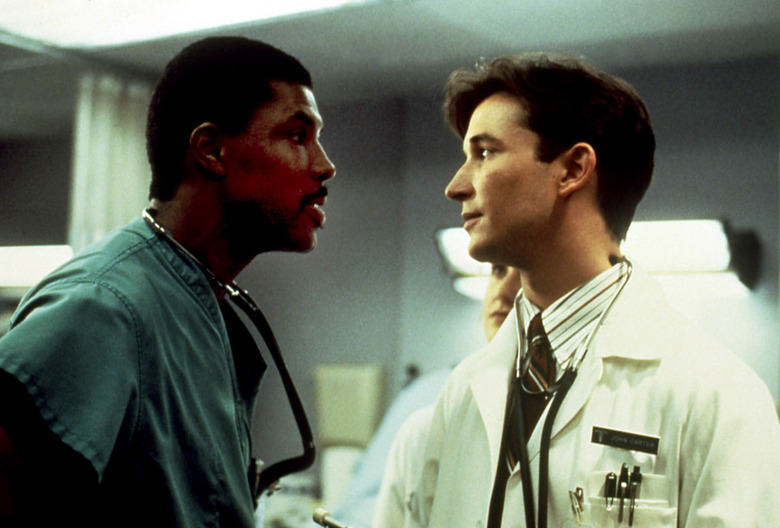
What I found was that I wanted to impress them. I wanted to make them think that I was good, and I wanted to make them trust that I would lead them. That was my intention at the outset — and it's interesting, because I haven't been as available to them, emotionally, as I usually am with the casts that I work with. But when we work together, anything professionally, in terms of playing in front of a camera, doing this kind of format, having a coming-out party in terms of publicity, and the early, nascent stages of fame, I've tried to make myself as available to them as they want me to be, without sounding like a know-it-all, or like somebody who's been there, done that.
I want to echo what you said. This is one of the most talented ensembles I've ever worked with in my life, and I feel very much like a Trojan horse who's going to be delivering this army into people's living rooms that they aren't expecting. I'm so proud of them, and I'm so pleased and grateful to be working alongside them. They really deserve a major shout out for how quickly they pick this stuff up, and how totally they immerse themselves in these parts. They really are dedicated, talented, facile performers. That's exactly what we were looking for, and they all delivered. I'm so happy that the world is going to get to see what they can do.
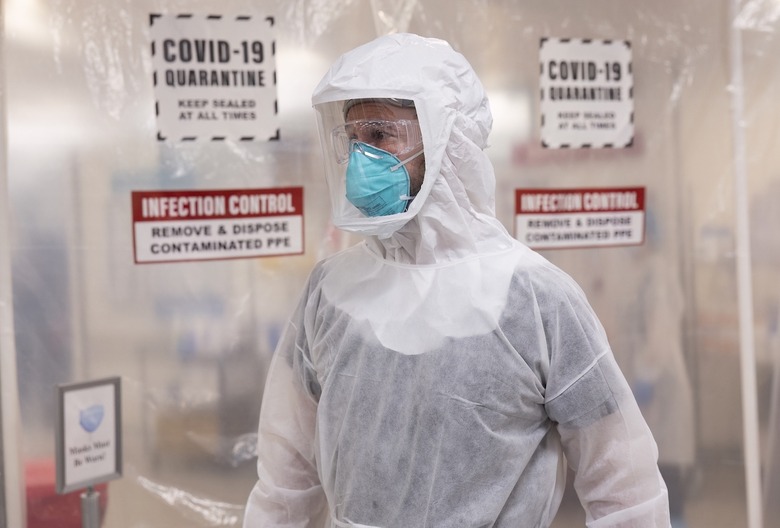
TVLINE | Let's talk a bit about Robby's trauma. Season 1 takes place on the fifth anniversary of his mentor's death. Beyond what we see in these early episodes, how much would you say this loss has impacted his life over the last several years?
Well, Dr. Adamson was a mentor figure, a pseudo-father figure, a good friend... all of those things. In some ways, he serves as a metaphor for that thing that we lost that we can't quite get back — that part of ourselves that we lost during the pandemic that has changed us in a way that we haven't really been able to synthesize, or process, or come to any kind of understanding about yet — mostly because, like Robby, we've been continually pressed into service, to move forward and move on, and normalize more and more outrageous circumstances, as if this is a normal mode of life. It builds up in aggregate.
The significance of this being the anniversary is there. I've been sort of cautious about making it cause and effect to what happens to Robbie emotionally because I didn't want it to be so one for one with a singular person or experience. To me, this is the straw that breaks the camel's back. What happens to Robby over the course of this day... it's the burdens we all carry. And it doesn't matter if you didn't lose your mentor. It may have been your grandfather.... It may have been your best friend's grandfather.... It may have been your senior year of high school... It may have been that job opportunity, where it seemed like you were on such a wonderful, momentous track, and then you just can't quite get your footing again. So, the metaphor of The Pitt is that we've all been in a sort of proverbial pit, and Robby is the every man that goes down to the bottom of that pit during the course of this shift and has to figure out how to climb his way back out.

TVLINE | Season 1 takes place over a single, 15-hour hospital shift. In success, I imagine subsequent seasons would maintain this real-time format. Have you had any discussions about how much time may pass between seasons? Do you think you'd pick up the next day, the next week...? Or might we pick up, say, a year later, and see how all of these med students, interns and residents are progressing?
That's exactly about as far as we've taken it. We've worked through those hypotheticals, and recognize the value of what a jump in time would give us, where you could play a lot with what happened in the interim as you're playing out what's happening in real time. That would be a good device, as would night shift or a holiday.... I think I speak for Scott when I say the idea of a Season 2 would be a blessing that neither of us have entertained because we've just wanted to land this plane as elegantly as we we can in Season 1.
TVLINE | I know you're still pals with ER castmate Eriq La Salle — who, coincidentally, also has a new show out the same day — Prime Video's On Call. I'm sure you're aware of the show, but did you realize The Pitt and On Call were coming out the same day?
No, but what can I say? The '90s are back.
New episodes of The Pitt release Thursdays at 9 pm ET/6 pm PT on Max. Grade the first two episodes once you've seen them below, then leave your review in the comments.
